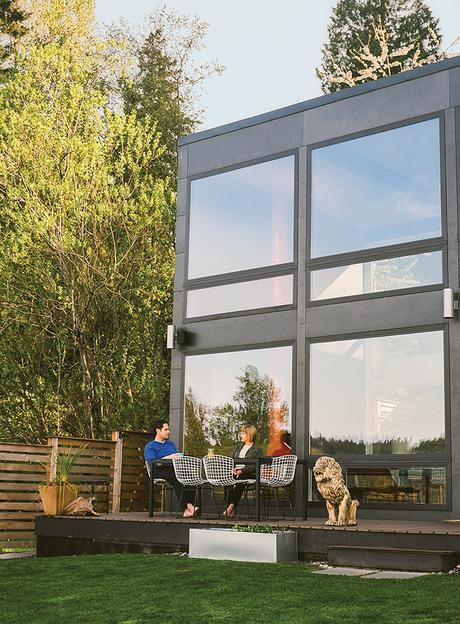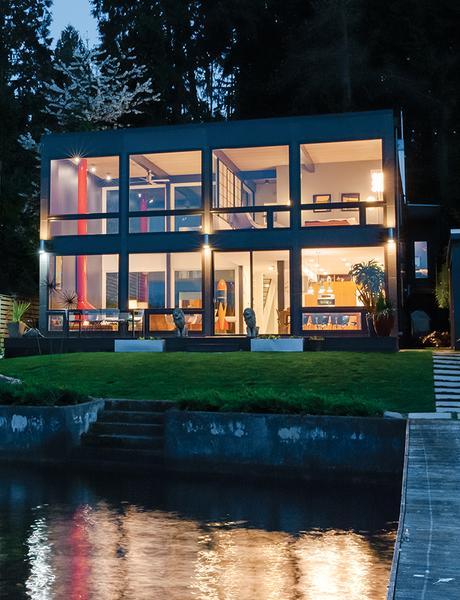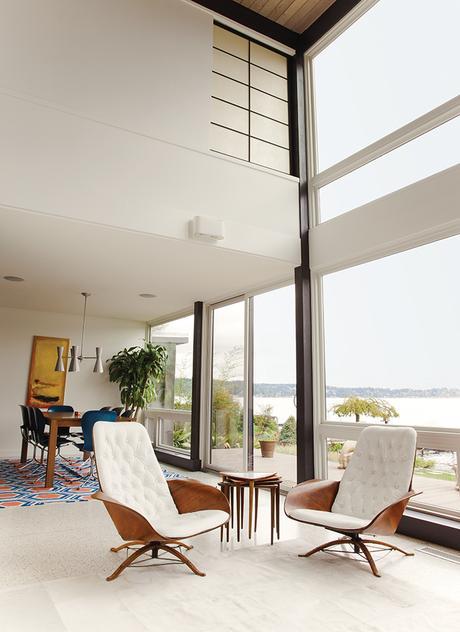 Sally Julien and Peter Loforte sit on the porch of the Aqua Lair, their restored 1960s house on Lake Sammamish, near Seattle. The Bertoia chairs and clay lion are from Pacific Galleries.
Project
The Aqua Lair
Architect
Schemata Workshop Inc.
Blip Design
Sally Julien and Peter Loforte sit on the porch of the Aqua Lair, their restored 1960s house on Lake Sammamish, near Seattle. The Bertoia chairs and clay lion are from Pacific Galleries.
Project
The Aqua Lair
Architect
Schemata Workshop Inc.
Blip Design
In 1963, the story goes, a mechanical engineer for McDonnell Douglas visited friends in Newport Beach, California, and fell in love with their house—believed to have been designed by Gordon Drake, or at least in his style. Ambitiously, if not ignorantly, the engineer tried recreating the house from memory in his home city of Issaquah, Washington, drafting blueprints and undertaking construction with his brother. What he didn’t account for, though, were the obvious differences in weather conditions between dry and sunny Southern California and the rain-slogged Pacific Northwest.
This shortsightedness, coupled with a layman’s understanding of construction, resulted in a Popsicle-sticks-and-bubble-gum structure whose open-air louvers welcomed—for nearly five decades—the ever-present moisture to rot, mold, sink, and ultimately destroy the house.

That’s when Sally Julien found it. The designer and her partner, Peter Loforte, who works at Microsoft, had recently fallen in love with nursing sick homes back to health. The Seattle couple had just come off an easy-breezy remodel of their Palm Springs vacation home when, a few months later, they discovered the throwback house in Issaquah, with its L-shaped, five-bedroom layout that cascades down to the waterfront of Lake Sammamish. In its dismal condition, the house was being advertised as a teardown.
“We started looking at it like, ‘Wow, this could be a good investment; it could be a really neat place,’” Julien says, recalling her optimism at the prospect of spiffing up the house to what its original owners had, perhaps, intended.
The couple had high hopes for a smooth process, but trouble began almost immediately. “Very little, if anything, had been done to the house since 1963,” Julien says. “Rolling off the Palm Springs remodel, we got a little cocky, I’ll admit. I got brought back down to earth very quickly.”
After calling in Seattle-based architect Jim Burton of Blip Design for the initial scheme, Julien turned to a friend, architect Grace Kim of Schemata Workshop, and contractor Steve Fradkin.
“There was no real structural logic behind the house,” says Fradkin, who had to reframe and waterproof about 65 percent of the house because of the rot; replace all the windows; add a new roof; and figure out head-scratching foundation problems.
For example, one day a demolition crewman put the tip of his wrecking bar on the ground for support while he caught a few moments of rest. He was shocked to watch the tool effortlessly sink into the ground like a chopstick into warm tofu. The poured-concrete foundation was sitting on a massive sinkhole. When Fradkin and his crew began excavating, they found that the original builders, when faced with the problem of an underground stream, apparently attempted to fill it by tossing in cut wood logs, sacks of concrete still in the bag, and other debris.
“I’ve been in business 23 years and have never seen anything like it,” Fradkin says. “Whoever built it didn’t understand it at all. They were obviously used to dry weather.” Fradkin decided not to disturb the sinkhole too much. It had been working up to that point; no reason to muck with it. Instead, he drove a three-inch pipe into the sinkhole and bracketed it to the concrete foundation. He then backfilled and buried the hole as much as possible—a dirty fix to a filthy problem.
Julien, however, was just about at her wit’s end. With the extensive rot, a sinkhole, and buried ductwork that was in need of replacing—not to mention the skyrocketing budget—the couple were prepared to walk.
“At least two times, I remember Sally and Peter had thrown up their hands and said, ‘That’s it. We’re going to sell the house,’” Kim says. “I said, ‘Sally, there is no house to sell. We need to put it back together to do that.’”

Once Fradkin solved the structural challenges, Julien got to work on the interiors. To enter the house, guests descend a staircase, walk through a small courtyard, and open two heavy wood doors, original to the house, that Julien and Loforte painted orange. The doors open to a reddish-orange abstract painting that Julien picked up in a Seattle antiques store. The vibrant piece serves as the basis for the interior color scheme: bright, fun, and a little cuckoo.
Case in point: When the need arose for a vertical design element in the living room, Julien set out with a friend to an antique mall, where a World War II test bomb hit the mark. “My friend was saying, ‘You can’t buy a bomb,’” Julien says. “And I’m ignoring her, like, ‘I think it’ll fit in your car.’ Next thing we know, we’re leaving with a bomb.”
Explosive decor aside, the true visual attraction is Lake Sammamish. Julien seized every opportunity to make it the star of the house. The kitchen space, for example, had been closed off and almost hidden, despite its potential to open up toward the lake. “That was the ’60s,” Julien says. “People didn’t want to see the kitchen.” Fradkin and his crew knocked down a wall and installed a moment frame to unlock the view to the water, which is really what the house has always been about. Only now, the water is kept safely outside.
- Log in or register to post comments
